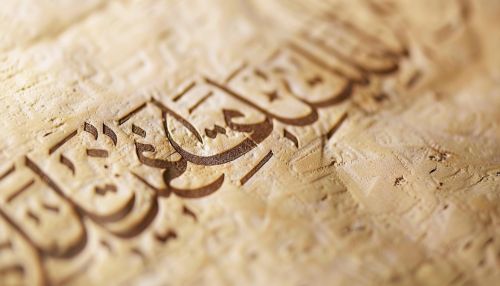Hussein: Difference between revisions
No edit summary |
No edit summary |
||
| Line 4: | Line 4: | ||
Hussein was the grandson of [[Prophet Muhammad|Muhammad]], the founder of Islam, and his name carries a great deal of respect and reverence among Muslims. Hussein ibn Ali, also known as Imam Hussein, is a significant figure in Shia Islam and is remembered for his martyrdom at the Battle of Karbala. | Hussein was the grandson of [[Prophet Muhammad|Muhammad]], the founder of Islam, and his name carries a great deal of respect and reverence among Muslims. Hussein ibn Ali, also known as Imam Hussein, is a significant figure in Shia Islam and is remembered for his martyrdom at the Battle of Karbala. | ||
[[Image:Detail-79055.jpg|thumb|center|Close-up of Arabic script on parchment, highlighting the name Hussein.]] | [[Image:Detail-79055.jpg|thumb|center|Close-up of Arabic script on parchment, highlighting the name Hussein.|class=only_on_mobile]] | ||
[[Image:Detail-79056.jpg|thumb|center|Close-up of Arabic script on parchment, highlighting the name Hussein.|class=only_on_desktop]] | |||
== Historical Figures == | == Historical Figures == | ||
Latest revision as of 19:24, 16 May 2024
Early Life
Hussein is a common Arabic name that has been used throughout history in various forms and variations. The name is derived from the Arabic word "Husn", which means "beauty" or "handsomeness". The name Hussein is often given to boys in Arabic-speaking countries and has significant historical and religious connotations in Islamic culture.
Hussein was the grandson of Muhammad, the founder of Islam, and his name carries a great deal of respect and reverence among Muslims. Hussein ibn Ali, also known as Imam Hussein, is a significant figure in Shia Islam and is remembered for his martyrdom at the Battle of Karbala.


Historical Figures
There have been many notable figures in history named Hussein. One of the most well-known is Saddam Hussein, the former president of Iraq. His rule was marked by wars, economic sanctions, and human rights abuses, and he was eventually overthrown and executed following the 2003 invasion of Iraq by U.S.-led forces.
Another notable figure is King Hussein of Jordan, who ruled the country for nearly 50 years, from 1952 until his death in 1999. His reign was marked by efforts to modernize Jordan and maintain stability in a region often fraught with conflict.
Cultural Significance
The name Hussein holds significant cultural and religious importance, particularly within the Islamic world. The story of Hussein ibn Ali's martyrdom is commemorated annually during the Islamic month of Muharram, in a period known as Ashura. This event holds particular significance for Shia Muslims, who view Hussein as the rightful successor to Muhammad.
The name Hussein is also used widely in literature and popular culture, often to denote a character's Arabic or Islamic heritage. It is a common name in many Arabic-speaking countries, and its use can signify respect and reverence for Islamic history and tradition.
